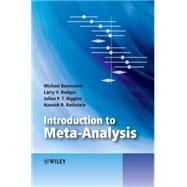Introduction to Meta-Analysis
, by Borenstein, Michael; Hedges, Larry V.; Higgins, Julian P. T.; Rothstein, Hannah R.- ISBN: 9780470057247 | 0470057246
- Cover: Hardcover
- Copyright: 4/13/2009
This book provides a clear and thorough introduction to meta-analysis, the process of synthesizing data from a series of separate studies. Meta-analysis has become a critically important tool in fields as diverse as medicine, pharmacology, epidemiology, education, psychology, business, and ecology.Introduction to meta-analysis:Outlines the role of meta-analysis in the research process. Shows how to compute effects sizes and treatment effects. Explains the fixed-effect and random-effects models for synthesizing data. Demonstrates how to assess and interpret variation in effect size across studies. Explains how to avoid common mistakes in meta-analysis. Discusses controversies in meta-analysis. Includes sections on additional readings and other resources.The book's approach is primarily conceptual, but with sufficient detail so that readers can implement the procedures in their own research. Key ideas are introduced using text and figures, followed by the relevant formulas and worked examples. These examples, as well as additional exercises and materials, may be downloaded from the book's web site (www.Meta-Analysis.com).The authors have extensive experience in the theory and application of meta-analysis. As a group, they have hundreds of publications in this area, as well as many years of experience teaching meta-analysis to researchers, clinicians and statisticians. This book builds on this foundation and will serve equally well as the text for a course in meta-analysis, as a resource for self-study, or as a reference.The approach taken by Introduction to Meta-analysis is intended to be primarily conceptual, and it is amazingly successful at achieving that goal. The reader can comfortably skip the formulas and still understand their application and underlying motivation. For the more statistically sophisticated reader, the relevant formulas, and worked examples provide a superb practical guide to performing a meta-analysis. Unlike other references in meta-analysis, which tend to focus on specific fields of research, Introduction to Meta-analysis provides an eclectic mix of examples from education, social science, biomedical studies, and even ecology. The summary points at the end of each chapter and the notes at the end are extremely useful. The sections on Simpson's paradox, and a unique perspective on meta-analysis in context are nothing short of gems. For anyone considering leading a course in meta-analysis, or pursuing self-directed study, Introduction to Meta-analysis would be a clear first choice. Jesse A. Berlin, ScD







